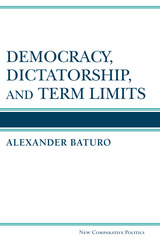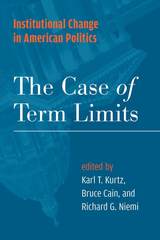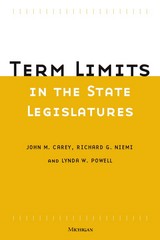
A national constitution or other statute typically specifies restrictions on executive power, often including a limit to the number of terms the chief executive may hold office. In recent decades, however, some presidents of newly established democracies have extended their tenure by various semilegal means, thereby raising the specter—and in some cases creating the reality—of dictatorship.
Alexander Baturo tracks adherence to and defiance of presidential term limits in all types of regimes (not only democratic regimes) around the world since 1960. Drawing on original data collection and fieldwork to investigate the factors that encourage playing by or manipulating the rules, he asks what is at stake for the chief executive if he relinquishes office. Baturo finds that the income-generating capacity of political office in states where rent-seeking is prevalent, as well as concerns over future immunity and status, determines whether or not an executive attempts to retain power beyond the mandated period. Democracy, Dictatorship, and Term Limits will appeal to scholars of democratization and executive power and also to political theorists.

Legislative term limits adopted in the 1990s are in effect in fifteen states today. This reform is arguably the most significant institutional change in American government of recent decades. Most of the legislatures in these fifteen states have experienced a complete turnover of their membership; hundreds of experienced lawmakers have become ineligible for reelection, and their replacements must learn and perform their jobs in as few as six years.
Now that term limits have been in effect long enough for both their electoral and institutional effects to become apparent, their consequences can be gauged fully and with the benefit of hindsight. In the most comprehensive study of the subject, editors Kurtz, Cain, and Niemi and a team of experts offer their broad evaluation of the effects term limits have had on the national political landscape.
"The contributors to this excellent and comprehensive volume on legislative term limits come neither to praise the idea nor to bury it, but rather to speak dispassionately about its observed consequences. What they find is neither the horror story of inept legislators completely captive to strong governors and interest groups anticipated by the harshest critics, nor the idyll of renewed citizen democracy hypothesized by its more extreme advocates. Rather, effects have varied across states, mattering most in the states that were already most professionalized, but with countervailing factors mitigating against extreme consequences, such as a flight of former lower chamber members to the upper chamber that enhances legislative continuity. This book is must reading for anyone who wants to understand what happens to major institutional reforms after the dust has settled."
---Bernard Grofman, Professor of Political Science and Adjunct Professor of Economics, School of Social Sciences, University of California, Irvine
"A decade has passed since the first state legislators were term limited. The contributors to this volume, all well-regarded scholars, take full advantage of the distance afforded by this passage of time to explore new survey data on the institutional effects of term limits. Their book is the first major volume to exploit this superb opportunity."
---Peverill Squire, Professor, Department of Political Science, University of Iowa
Karl T. Kurtz is Director of the Trust for Representative Democracy at the National Conference of State Legislatures.
Bruce Cain is Heller Professor of Political Science and Director of the Institute of Governmental Studies at the University of California at Berkeley, and the Director of the University of California Washington Center.
Richard G. Niemi is Don Alonzo Watson Professor of Political Science at the University of Rochester.

The term-limit movement--designed to limit the maximum time a legislator can serve in office--swept through the states like wildfire in the first half of the 1990s. By November 2000, state legislators will have been "term limited out" in eleven states.
This book is based on a survey of nearly 3,000 legislators from all fifty states along with intensive interviews with twenty-two legislative leaders in four term-limited states. The data were collected as term limits were just beginning to take effect in order to capture anticipatory effects of the reform, which set in as soon as term limit laws were passed. In order to understand the effects of term limits on the broader electoral arena, the authors also examine data on advancement of legislators between houses of state legislatures and from the state legislatures to Congress.
The results show that there are no systematic differences between term limit and non-term limit states in the composition of the legislature (e.g., professional backgrounds, demographics, ideology). Yet with respect to legislative behavior, term limits decrease the time legislators devote to securing pork and heighten the priority they place on the needs of the state and on the demands of conscience relative to district interests. At the same time, with respect to the legislature as an institution, term limits appear to be redistributing power away from majority party leaders and toward governors and possibly legislative staffers.
This book will be of interest both to political scientists, policymakers, and activists involved in state politics.
John M. Carey is Assistant Professor of Political Science, Washington University in St. Louis. Richard G. Niemi is Professor of Political Science, University of Rochester. Lynda W. Powell is Professor of Political Science, University of Rochester.
READERS
Browse our collection.
PUBLISHERS
See BiblioVault's publisher services.
STUDENT SERVICES
Files for college accessibility offices.
UChicago Accessibility Resources
home | accessibility | search | about | contact us
BiblioVault ® 2001 - 2024
The University of Chicago Press









